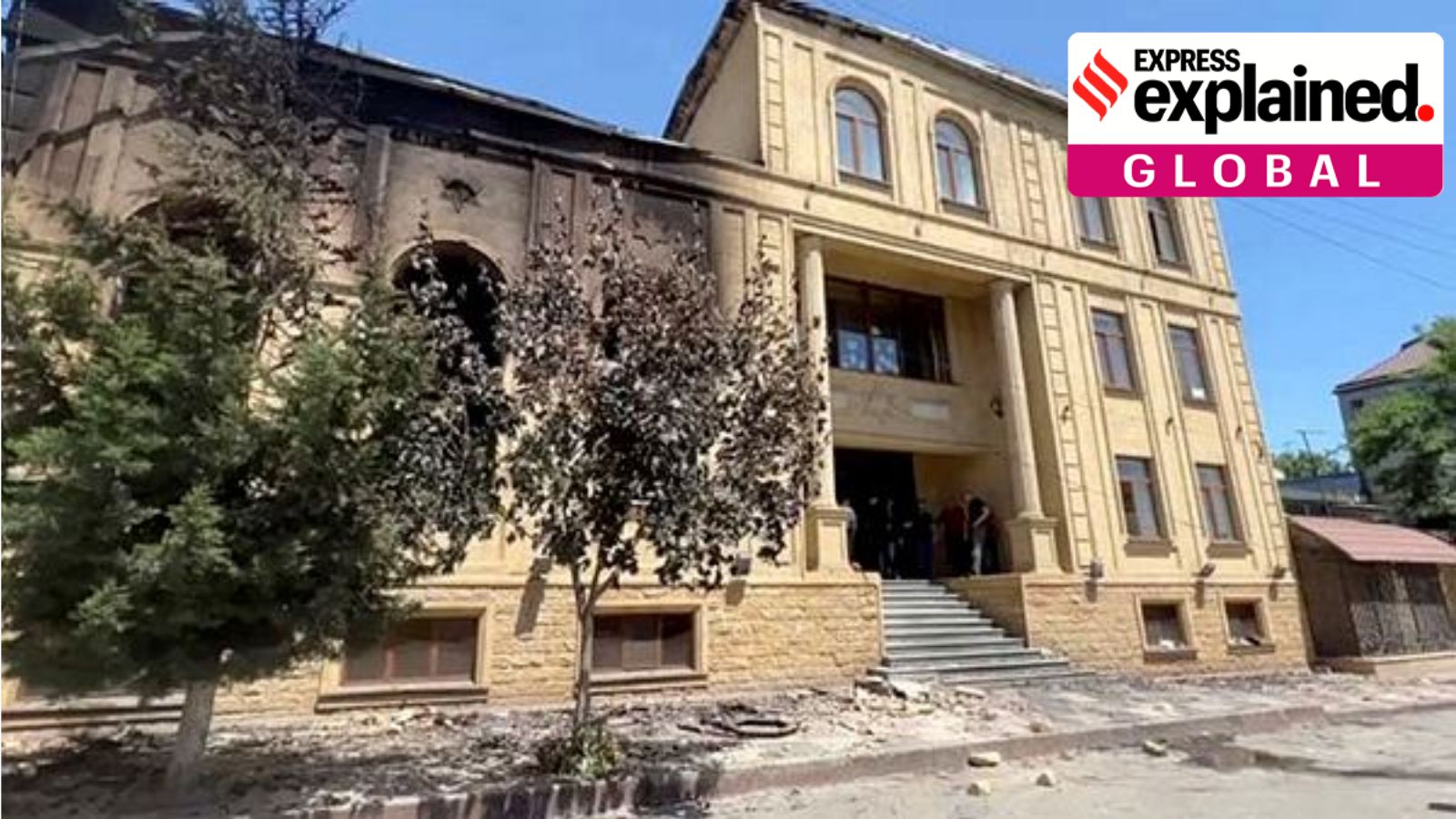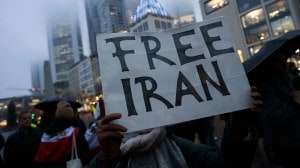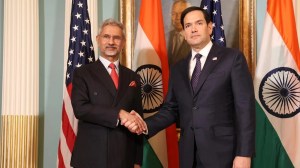Why Dagestan remains a restive republic in Russia
Armed assailants attacked a synagogue and a church in Russia’s Dagestan on Sunday. Here is a brief history of the region, and its socio-political makeup.
 A view of Derbent synagogue following an attack by gunmen and a fire, in Derbent in the region of Dagestan, Russia June 24, 2024, in this still image taken from video. (Head of the Dagestan region Sergei Melikov via Telegram/Handout via REUTERS)
A view of Derbent synagogue following an attack by gunmen and a fire, in Derbent in the region of Dagestan, Russia June 24, 2024, in this still image taken from video. (Head of the Dagestan region Sergei Melikov via Telegram/Handout via REUTERS)At least 15 policemen and several civilians were killed by gunmen in possibly coordinated attacks in Russia’s southern republic of Dagestan on Sunday (June 23) evening.
According to Dagestan’s Interior Ministry, the assailants shot at a synagogue and a church in the city of Derbent, located on the Caspian Sea.
Two of the gunmen have been identified as the sons of a local politician, Magomed Omarov, who heads the Sergokalinsky district of Dagestan. Omarov has since been suspended from his post for “actions discrediting” the party, according to a report by Russian newspaper Novayeta Gazeta.
This is the second major instance of armed violence in Russia this year, following an attack on a Moscow concert hall which left 145 dead in March.
Here is all you need to know about Dagestan, which has historically been one of Russia’s restive provinces.
Social and religious context
The Republic of Dagestan is located on Russia’s southern tip. The Caspian Sea lies to its east, Azerbaijan to its south, and Georgia to its west. To its northwest lies Chechnya, another restive Russian republic. Dagestan literally means “the land of the mountains” in Persian and Turkish, and lies on the transcontinental Caucasus mountain range. It, along with Chechnya, is one of the seven republics forming the North Caucasian Federal District in Russia.
According to a 2012 census, Dagestan has a population of 2.2 million, with at least 83% practicing Islam. The region is also home to minority native Tati-speaking Jews, and pentecostal Christians belonging to the Lak ethnicity.
Over the years, Dagestan has seen the rule of various foreign rulers. Caucasian Albanians ruled from the 1st to the 3rd century CE, when Sassanid Persians took over. Then came the Arabs, in the 7th and 8th centuries, and the Mongols in the 13th century. The Safavids of Persia ruled from the 16th century to the 19th century, before Dagestan was annexed by Tsarist Russia after two treaties with Iran, in 1813 and 1828.
Islam entered the region with the Arab traders in the southern city of Derbent, and over time has become increasingly central to the identity of Dagestan’s residents. Today the republic hosts 3,000 mosques, Islamic institutes, and schools.
Rise of militancy
According to historian Galina Yemelianova, the progress of Islam has been inherent to establishing Dagestan’s relations with the world — from the early embrace of Islam by Laks in the 8th century to the emergence of centres of spiritual enlightenment in the cities of Derbend, Tarki, Kazikumukh, and Kunzah (‘Islam and nation building in Tatarstan and Dagestan of the Russian Federation’, 1999).
The (Christian) Russian Empire’s annexation of the region did not go uncontested and prompted the uprising against the empire which snowballed into the Caucasian War (1817-1864). The highlanders protested the imposition of heavy taxes as well as the confiscation of estates. Multiple uprisings were also witnessed against Communist rule which began from 1917, and sought to secularise the region, minimising the presence of any religion.
Following the collapse of the USSR in 1991, Dagestan declared itself a republic within the Russian Federation. It maintained its autonomous status but did not seek sovereignty for itself.
Things came to a head in 1999, when the Islamic International Peacekeeping Brigade, a Chechen Islamist group invaded Dagestan, aiming to create an independent Islamic State of Dagestan. Russia retaliated and eventually invaded the neighbouring mountainous state of Chechnya in a six-month-long military offensive.
Islamist militant groups led an armed insurgency against Russian security forces for about a decade until 2017. Human Rights Watch in their 2015 report ‘Invisible War’ had described the brutal suppression and crackdown on Salafi Muslims in Russian counter-insurgency operations which had forcibly displaced civilians, and destroyed their property under suspicion of harbouring bombs.
In 2023, following Israel’s invasion of Palestine, Dagestan has again seen a surge of violence, with mobs targeting the region’s Jewish minority. A mob gathered outside a hotel they suspected of harbouring ‘Israeli refugees’ on October 28, while another stormed the Makhachkala Uytash Airport searching for Israeli passengers who had arrived on a flight from Tel Aviv a day later. A group even attacked a Jewish community centre under construction on October 29.
- 01
- 02
- 03
- 04
- 05






































